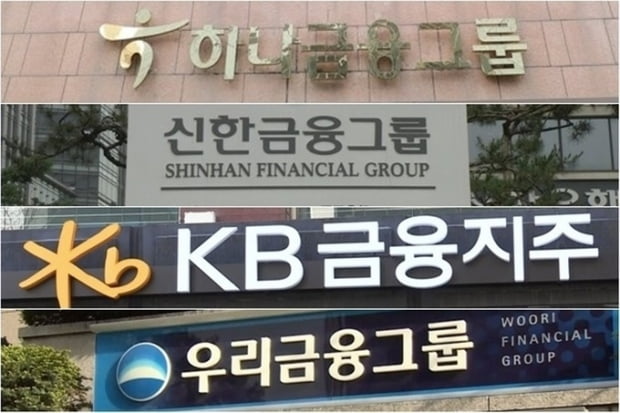From dividend reduction recommendations to demand for profit sharing
Banknote “policy contradiction”

Photo = Yonhap News
After the coronavirus, banknotes fell into a dilemma as they were selected as the main target for participation in the’profit sharing system’. This is due to the fact that it faced the Financial Supervisory Service’s recommendation to refrain from paying dividends and withhold profits to alleviate the shock after the coronavirus. As the government’s’arm twisting policy’ is repeated, it is analyzed that it is inevitable to damage the shareholder value of domestic financial holdings.
◆”Do you want to save profits or share?”
According to the banknotes on the 21st, most banks are expressing confusion about the’profit sharing system’ being discussed in the political world. This is because on the 19th, Hong Ik-pyo, chairman of the Democratic Party’s Policy Committee, designated the bank as the target of participation in the profit-sharing system, saying, “The industry that is seeing the most profit in the Corona 19 situation is the financial industry.” Some of the party are discussing △stop receiving interest or lower interest rates △downgrade credit rating, postpone foreclosures △funding △issuance of socially responsible bonds as a way of sharing profits.
Banknotes are embarrassing. This is because there was a strong stance to prepare for the corona crisis by reducing dividends and accumulating more provisions. Financial Supervisory Commissioner Yoon Seok-heon ordered to reduce dividends at a press conference last month, saying, “I did a stress test on the economic situation after Corona 19, and even some financial holdings failed in an L-shaped (non-rebound) situation.” As such recommendations continue, the industry expects that the dividend payout ratio of the four major landlords from 25 to 27 percent last year will fall to 22 to 23 percent this year.
Financial holdings have succeeded in defending their earnings despite the corona crisis last year. The cumulative net income of the four major financial holding companies in the third quarter rose 15% year-on-year. However, it is more thanks to higher-than-expected performance in securities and credit cards than banks. According to the Financial Supervisory Service, the cumulative net income of domestic banks in the third quarter of last year was 1.03 trillion won, a decrease of 1.8 trillion won (15%) from the same period last year (12.100 billion won). In particular, concerns over insolvency remain as the deferral measures for principal and interest have been extended until this year.
In the midst of this, the voice of the politicians’share the profits’ is the story of the banking sector that it has been rejected. An executive of a commercial bank criticized, “When they said, “Be prepared for a crisis by saving what you’ve seen,” he said, “I don’t know which beats to fit because they are now asking to share profits.”
◆”There is a possibility of inconsistency under the criminal law”
Banks have entered into legal review, seeing that the benefit-sharing system may actually materialize. As the Moon Jae-in administration has tightened loan regulations, and there is precedent, such as the FSS direct pressure to reduce bank dividends, it is judged that the additional demand for a partial share of bank profit cannot be ignored.
What the banks are concerned about is the criminal offense. Sharing the profits of the shareholders, who are the owners of the bank, means that it is highly likely to undermine shareholder interests and infringe property rights. A bank official said, “The main point of the profit-sharing system mentioned in the passport means to donate or provide some of the profits generated by the bank to a third party,” said a bank official. “Although the bank plays an important role in the public interest, it is a commercial company for profit. Considering that the profit-sharing system is less effective for banks, we concluded that there is not a small possibility that a crime of infidelity will be established.”
◆Profit sharing system that even unions are concerned about
Even banking unions have expressed concern one after another. This is because it contradicts the logic of capitalism to reduce the share to shareholders and to use the remaining resources for social return. There are also criticisms that the government should easily hand over the support for the vulnerable to private companies.
“Participating in the profit sharing system will reduce the bank’s net profit, and it will have no choice but to affect management as well as employees.” “It’s a problem to create an atmosphere politically.” Another bank union executive also said, “If profits decrease, it will be difficult to improve salaries and welfare, and employees who have employee ownership will suffer enormous losses as shareholders.”
The financial union has yet to set an official position. “I agree with the solidarity of workers for resolving polarization, but it is difficult to give a position because detailed plans are not available,” said Park Hong-bae, chairman of the financial union. And use it together.”
An executive of a commercial bank pointed out, “In the meantime, banks have been mobilized indefinitely whenever the government has launched a new business, such as interest reduction, the Good Landlord Movement, and the Korean New Deal.”
Reporter Jeong So-ram/Kim Dae-hoon [email protected]
